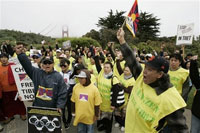China manhandles British journalist as he tried to report on pro-Tibetan protests in Beijing
The International Olympic Committee said Thursday it frowned on the actions of Chinese security officials who allegedly manhandled a British journalist as he tried to report on a pro-Tibet protest in a Beijing park.

IOC spokeswoman Giselle Davies said journalists should not be prevented from doing their jobs, a day after John Ray of London-based ITV News said he was wrestled to the ground and briefly held by police who apparently mistook him for a protester.
"The IOC does disapprove of any attempts to hinder a journalist who is going about doing his job seemingly within the rules and regulations," Davies told a daily press briefing. "This, we hope, has been addressed. We don't want to see this happening again."
The incident raised concerns that Beijing was not fulfilling its pledge to give foreign media unrestricted access to report on the games.
Asked repeatedly if IOC officials are embarrassed that China was not living up to its promises, Davies would only say they are happy with the way China is running the sporting events.
Ray, 44, said police stopped him as he rushed to the Chinese Ethnic Culture Park, south of the main Olympic stadium, where a protest was being held.
A small struggle ensued, Ray said, in which he was forced to the floor, dragged and "manhandled" before he was able to show his Olympic press credentials and was released. An official from the Beijing Public Security Bureau said officers mistook him for an activist.
Police has deported the protesters, seven Americans and a half-Tibetan woman with Japanese citizenship, according to Students for a Free Tibet, the group that organized the action.
It was the largest in a string of brief protests in Beijing, most involving fewer than five protesters, that started immediately before the games began last week.
Beijing organizing committee vice president Wang Wei defended China's policy on demonstrations, saying China respected free speech and had set up designated protest zones away from the sports venues.
In July, China said protests would be allowed during the Olympics in three parks far away from the main venues. But applications for protests must be made five days in advance, with a response promised 48 hours before the requested rally time.
"The three parks being opened is based on the constitution of China that people are allowed to demonstrate if they have some issues," Wang told the briefing. "I think that's one step further for China to open up and I think it's very good gesture."
However, he said he had no information on the number of protest permits that have been granted. No demonstrations have been reported in the zones, and Human Rights Watch said in a statement Wednesday that Chinese activist Ji Sizun was taken away by security agents after applying to protest against official corruption.
The statement was issued the same day the Chinese Foreign Ministry's spokesman said suggestions that Chinese petitioners were being prevented from holding protests during the Olympics were the result of "misunderstandings."
"In China, nobody will be persecuted or placed under house arrest because of their speech, only those who break laws will be punished in accordance with the law," Qin Gang told a briefing. "Chinese citizens, in accordance with the law, enjoy the freedom of speech and other kinds of rights and freedoms."
Mi Jinli, husband of a housing activist, said Thursday he was still not allowed to see his wife, Zhang Wei, who was taken from her home last week after trying to apply for permission to protest. Zhang is being officially detained for a month for "disturbing social order," Mi said.
A Chinese blogger, warned last month to stay away from Beijing during the Olympics, said he was escorted back to his hometown Thursday and told not to leave.
Zhou Shuguang, who uses the online name Zuola, said by phone that local officials picked him up in Fengmuqiao, near his hometown in central Hunan province, and "forced" him back home. Zhou, who said he had gone to visit his sister, said he was threatened when he initially refused.
A woman answering phones at the Fengmuqiao town government Thursday evening said she had not heard of Zhou.
Zhou, 27, said he plans to visit Beijing this weekend to handle personal matters and meet with other journalists.
The pro-Tibet group that held Wednesday's protest said it never considered applying through official channels for permission to hold a demonstration.
"It's clear to us that the protest zones are just a cynical public relations ploy on the part of the Chinese authorities," said Lhadon Tethong, executive director of Students for a Free Tibet, which has staged several protests in Beijing and elsewhere before and during the games.
"We can see that the petitioners who made this attempt to speak have now suffered the consequences," she said. "Sadly, I think the protest zones are just a trap at some level."
Subscribe to Pravda.Ru Telegram channel, Facebook, RSS!




